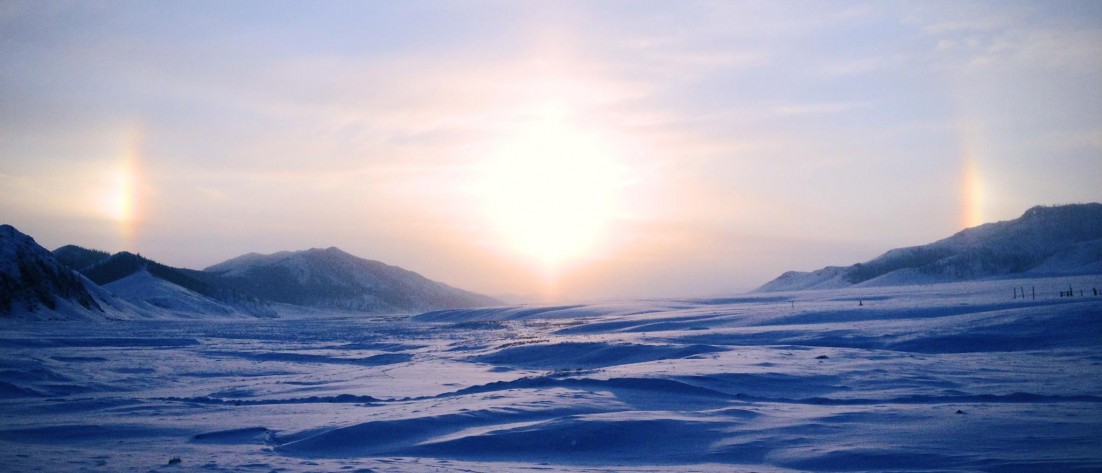“What’s your favorite color?” I used to ask my students in English and my acquaintances in Mongolian, and more often than not, I was surprised by the answer: white.
I think it’s probably safe to say that most Americans, unless they’ve studied or worked with lighting design, think of white not as a color, but as the absence thereof. It’s ceilings and doors and moldings that frame brighter-colored walls without calling attention to themselves; it’s a canvas not yet painted, a page not yet filled. It is, metaphorically and literally, a blank slate, a color whose only cultural connotations are of purity – which is to say, absence.
Mongolians feel very differently. Not only is white a color, it’s one of immense significance; after blue, it’s probably the second-most ceremonially important color.
That fact is particularly evident at this time of year. This Friday marks the beginning of one of the biggest holidays of the Mongolian calendar: Tsagaan Sar, which literally translates to white moon/month. That’s some cultural heft right there; while we westerners affiliate certain colors with particular holidays, we don’t call Christmas “red and green day.”
But what makes this month “white?” The moon itself? That would be my first guess, especially if the holiday fell on a full moon. But it doesn’t; it marks the beginning of the lunar cycle, starting the day after a night devoid of any moon at all. During Tsagaan Sar, even a clear night is frightfully dark out in the countryside, since the moon’s only presence is the tiniest of slivers.
The snow? That might be your next guess, and it wouldn’t be a bad one. Snow blankets the Mongolian landscape unmelted from the beginning of November to the end of February and can continue to color it as early as August, or as late as June. For countryside-dwelling herders, it is the color of half their world for up to half of the year, a ceaseless sheet of brilliance that turns many of their eyes blue with cataracts by the time their grandchildren are born. Snow is a source of beauty, but also of danger; too much of it will keep their herds from being able to graze on the dead remnants of last summer’s grass. It is also more likely to fall after Tsagaan Sar than in the two months previous, during which the weather is often too cold for snow.
But while snow is a fact of life in Mongolia, it’s not a sustainer of life, and so white is most strongly and importantly associated not with snow, but with milk.
When I’ve stayed with nomadic families, I’ve noticed that the first thing they do in the morning is to light a fire in the stove; the second, to heat a big bowl of water over that fire and draw off what they need for other uses; the third, to add the tea leaves, milk, and salt needed to make suutei tsai, or milk tea, which they’ll pour into a thermos to be drunk throughout the day. It’s what they give to a visitor the moment he crosses the threshold, what they socialize over and warm their hands with, and what they drink with meals, since they largely believe that drinking cold water with hot food will make you sick.
But the fourth thing nomadic families do, before anyone gets to drink the prepared milk tea, is take a ladle-full outside and fling it skyward in an offering to Tenger, the shamanist sky god. Even apartment-dwelling city folks lean out their windows with full spoons to participate in this ritual. The Mongolian gods must like milk, because their religious sites are soaked in it: splashed across ovoos and shrines, neatly collected in cups around their bases, and even illuminating temples in the form of milkfat-based candles. Seeing these religious applications was what helped me to understand that milk, and the mind-boggling array of things made with it, are much more than a mainstay of the Mongolian diet. You don’t make a point of sacrificing cheap gruel to a household god, no matter how much of it you eat; you give the gods the best of what you have.
You welcome important guests and occasions with it, too. When I visited the Mongolian countryside on an outreach trip with the other Fulbrighters and some higher-ups from the Embassy, the mayor of Tosontsengel greeted us with a copper cup of milk, which we passed between us peace-pipe style. On my last day at the school where I’d taught for a year, I was presented with a similar cup, also filled with milk. And when an American friend married a Mongolian woman, his father-in-law handed him a silver cup of milk as part of the ceremony, from which he and his new bride then drank.
After witnessing these and many other ceremonial uses of milk, I eventually learned not to be surprised when my students told me their favorite color was white. To me, it’s the color of the stuff I put on my cereal or in my coffee – but to them, it’s life.


























